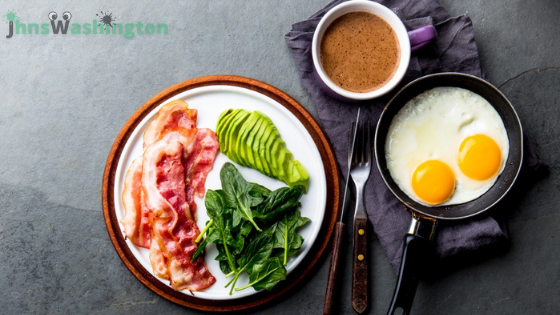
The Bulletproof Diet, created by Dave Asprey, is a high-fat, low-carbohydrate diet gaining in popularity in recent years. The diet is based on the theory that eating a high-fat, low-carbohydrate diet can help you lose weight and improve your health.
But does it work? How does it affect your body over time? In this guide to the Bulletproof Diet, we’ll explore how it works, how to transition to the diet if you want to try it out, and whether or not the diet will help you with your weight loss goals.
What does “Bulletproof” mean?
Dave Asprey has spent 15 years and over $ 300,000 to "hack" his own biology. According to Asprey's book, Bulletproof, the investment led to a state of high performance where you can take control of and improve the biochemistry of your body and brain so they work together, helping you perform at levels far beyond what would be expected without burning out, getting ill, or allowing stress to dictate your decisions.
What is bulletproof coffee?

Bulletproof coffee is a high-fat, low-carbohydrate drink that has become popular in the last few years. The coffee is made by blending coffee with butter and MCT oil, which are thought to help burn fat and promote weight loss. Some people also claim that bulletproof coffee can help increase energy and cognitive function. While there is some evidence to support these benefits, more research is needed to confirm whether or not bulletproof coffee is truly beneficial.
MCT stands for “medium-chain triglycerides” which are fatty acids. These fatty acids are good for your health. There are four kinds: lauric acid, caprylic acid, caproic acid, and capric acid. Coconut oil contains all four of these fatty acids.
The Bulletproof Diet focuses on losing weight to about 0.45 kg per day, gaining more energy and focus.
It works on high-fat, low-carb, moderate-protein foods with intermittent fasting.
The company producing this diet is Bulletproof 360, Inc.
Some people say the Bulletproof Diet helped them lose weight and improve their health, while others question these supposed results.
In this article, we review and discuss all the details about this so-called bulletproof diet and its effect on health and weight loss.
What is the Bulletproof Diet?

The Bulletproof Diet, created by Dave Asprey, is a high-fat, low-carbohydrate diet that has been gaining in popularity in recent years. The diet is based on the theory that eating a high-fat, low-carbohydrate diet can help you lose weight and improve your health.
The diet recommends that you eat a lot of healthy fats, including saturated fats, and avoid foods that are high in carbohydrates.
The Bulletproof Diet was devised by Dave Asprey, a former technology executive after he spent years battling his weight. The diet's anti-inflammatory properties are designed to help people shed pounds quickly.
Why Did I Try the Bulletproof Diet?
I came across the Bulletproof Diet a few years ago when I was looking for ways to lose weight and increase my energy. The Bulletproof Diet combines two of the most potent weight-loss tactics: high-fat, low-carbohydrate diets and intermittent fasting. I already knew that very low-carb diets were effective for losing weight, so it didn't take much convincing for me to give the Bulletproof Diet a try.
Benefits of the Bulletproof Diet
Dave Asprey’s Bulletproof diet is built on a foundation of healthy fats, grass-fed Meat and seafood, non-starchy vegetables, and minimal fruit. This way of eating has been shown to promote weight loss and numerous health benefits.
Weight loss: The Bulletproof diet puts you in what’s known as ketosis, a metabolic state where your body burns fat instead of glucose for energy.
Transitioning to the Bulletproof diet
While it’s easy to lose weight, it’s not always healthy. Crash diets can cause your metabolism to slow down, which means you burn fewer calories even when you aren’t dieting. The Bulletproof diet is different because it focuses on health and weight loss. It promotes higher fat intake and lowers carbohydrate consumption with no calorie counting or portion control. Transitioning to a high-fat diet can be difficult at first, but many people find they eventually feel better and start seeing results once they make their changes permanent.
Pros of the Bulletproof diet
The Bulletproof diet promotes some benefits, including weight loss, increased energy levels, and more. A high-fat, low-carbohydrate diet like the Bulletproof diet can be good for your heart health as well because it lowers cholesterol and keeps your blood pressure in check.
It also gives you more control over your appetite. By providing a steady supply of fat and protein instead of carbohydrates, which spike up quickly and then drop off quickly, you’re less likely to feel ravenous between meals.
Additionally, some people experience decreased hunger when eating a high-fat diet compared with one primarily made up of carbohydrates.
Cons the Bulletproof diet
You can’t eat many things on the Bulletproof diet, including grains, dairy products, legumes, added sugars, and alcohol.
These restrictions make it hard to stay on a healthy diet for an extended period. While some people may be able to adapt their lifestyles well enough to stick with eating like a caveman (or cavewoman), others may have trouble following such restrictive guidelines.
If you plan on adopting a high-fat diet in any capacity, you must have realistic expectations about what your day-to-day life will look like while sticking with such a strict regimen.
How does it work The Bulletproof Diet?
- It is a cyclical keto diet, a modified form of the ketogenic diet called the Bulletproof Diet.
- It comprises consuming high-fat, low-carbohydrate foods for 5–6 days a week, followed by 1–2 days of carb refeeding.
- It would help to consume 75% of your calories from fat, 20% from protein, and 5% from carbs while on a ketogenic diet.
- This puts you in ketosis, a natural state when your body uses fat for energy rather than carbs.
- You should eat sweet potato, squash, and white rice on carb-refeed days to raise your daily carb consumption from 50 to 300 grams.
- According to Asprey, a carb refeed helps prevent long-term keto diet adverse effects, including constipation and kidney stones.
- The diet revolves around Bulletproof Coffee, coffee blended with grass-fed unsalted butter, and MCT oil.
- In addition to suppressing appetite, Asprey claims this beverage increases energy and mental clarity.
- The Bulletproof Diet also includes intermittent fasting or going without food for short periods.
- Intermittent fasting, says Asprey, works well with the Bulletproof Diet because it provides constant energy without crashes.
- However, Asprey's concept of intermittent fasting is ambiguous because he recommends a cup of Bulletproof Coffee every day.
- The Bulletproof Diet is a cyclical ketogenic diet based on Bulletproof Coffee, a high-fat variation of ordinary coffee that involves intermittent fasting.
Does the bulletproof diet help lose weight?
There has been no research done on the Bulletproof Diet and weight loss.
However, evidence shows that there is no one-size-fits-all diet for weight loss.
Low-carb, high-fat diets like the keto diet have been found to help people lose weight faster than other diets, but the benefit seems to fade over time.
Your ability to stick to a low-calorie diet for an extended length of time is the best predictor of weight loss.
As a result, the influence of the Bulletproof Diet on your weight is determined by the number of calories you consume and how long you can stick to it.
Ketogenic diets are satisfying and may allow you to eat less and lose weight quickly due to their high-fat content.
However, because the Bulletproof Diet does not restrict calories, it is possible to maintain a healthy weight solely by eating Bulletproof foods.
Losing weight isn't that simple. Complex factors such as heredity, physiology, and behavior all have a role in your weight.
As a result, no matter how "bulletproof" your diet is, you won't always be able to rely simply on your food intake and may need to make a conscious effort to cut calories.
For the diet to work, you must stick to it for a long time, which may be difficult for some people.
The Bulletproof Diet hasn't been studied in depth. It depends on how many calories you consume and how well you stick to it to see if it can help you lose weight.
Bulletproof diet and Intermittent fasting
Research suggests that intermittent fasting may help you lose weight and improve your health. It involves not eating for some time, such as during a window of 8-16 hours (depending on which plan you choose) each day.
This fast is generally broken into smaller periods throughout your day. During one such fasting period, it's recommended that you drink Bulletproof Coffee – a mixture of grass-fed butter and medium-chain triglyceride oil.
This can lead to an easier transition into fasting because many people report feeling energized after drinking Bulletproof Coffee, compared with other types of fats or oils.
Because of these reported benefits, bulletproof diet advocates claim that intermittent fasting has helped them lose weight more quickly than restricting calories in a more conventional way.
One study found that people who followed an intermittent fasting diet lost about five pounds over two months compared to a group who ate healthy but unrestricted diets; additional studies suggest intermittent fasting could be effective for weight loss.
However, some downsides: Some research shows that very low-calorie diets might make it harder to maintain muscle mass.
Is intermittent fasting healthy?
"Many patients achieve sustainable weight loss following some iteration of IT," Duggan says. "But it isn't always appropriate for everyone." Beyond the obvious contraindications such as pregnancy, there may be patients who experience eating disorders after starting an IT diet. “Furthermore, it's not recommended for anyone with blood sugar issues; fasting can raise cortisol levels, which raises blood sugar levels.”
-
The main idea behind Bulletproof Diet is to consume 50 to 60 percent of your daily calories from healthful fats, 20 percent from protein, and the remainder from vegetables.
- Avoid grains and legumes when eating Bulletproof. They're not part of the Bulletproof Diet. Off the table are pasteurized milk, industrially raised meat, soda and juice, farmed seafood, and anything fried or microwaved.
- The diet bears some similarities to the Paleo Diet, however, Asprey says it is much more focused on the quality of ingredients and the effects of cooking on different foods. On the Bulletproof website, they say: "If you can't find Grass-Fed beef, choose the leanest cut of grain-fed beef possible." If you can find Grass-Fed meat, choose the fatter cuts possible. Why? Industrial animals have Omega 6 fats and accumulated toxins from the feed. Grass-fed animals have Omega 3 healthy fats and low levels of toxins. Here are some ideas.
What do you eat on a bulletproof diet?
The Bulletproof diet is a high-fat, low-carbohydrate diet, and for example, Bulletproof coffee is bulletproof coffee plus grass-fed butter and medium-chain triglyceride (MCT) oil.
MCTs are fats found in coconut oil that can help boost brain function, increase satiety, and reduce hunger. Another popular choice for a bulletproof diet is meat cooked in high-quality grass-fed butter. Plus, up to your fat content by snacking on nuts and avocados throughout the day instead of carbs like chips or crackers.
What is the purpose of the Bulletproof Diet?
The Bulletproof diet is designed to help you lose weight and control body fat levels. According to its author, Dave Asprey, it works because it contains high amounts of monounsaturated fats that enhance mental function while also stabilizing blood sugar levels. It has a low glycemic index, which makes it different from other high-fat diets and thus easier for your body to process.
The diet focuses on eating whole foods; Asprey doesn't believe in going out for fast food or pre-packaged meals because they often contain trans fats or high fructose corn syrup. Instead, he encourages people on his diet plan to eat real foods like eggs, grass-fed beef, and vegetables at every meal.
Conclusion
- Dietary ketogenic cycles are combined with intermittent fasting.
- With a daily pound (0.45 kg) loss, it claims to increase energy and focus. But there's no proof.
- It may help control appetite, but it may be difficult to follow.
- Remember that the diet promotes false health claims and requires branded items. The best way to maintain a healthy relationship with food is to follow tried-and-true nutritional advice.
